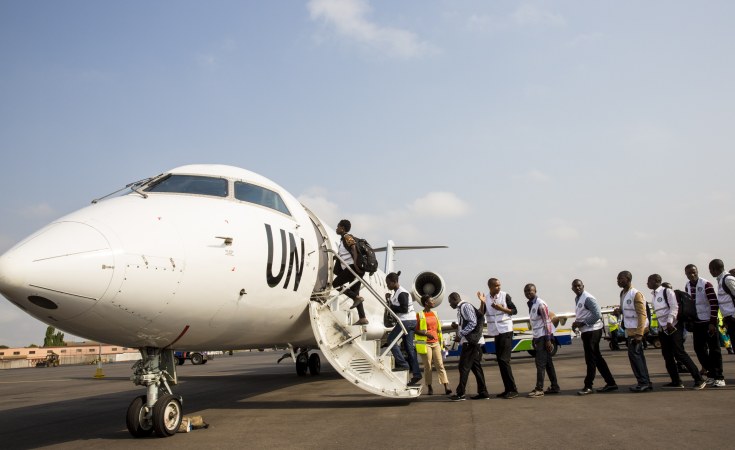Last week the UN Security Council declared the current Ebola outbreak in West Africa "a threat to international peace and security". As the world body met to discuss the most deadly outbreak of the haemorrhagic fever since it was first uncovered in 1976, fatalities soared in the hardest-hit countries.
Sierra Leone lost a fourth medical doctor in the line of duty. Virtually her entire family has been infected by the virus and quarantined. In the same week, a hardworking male nurse from Freetown's military hospital succumbed to Ebola, joining a long list of frontline healthcare workers who have perished. The nurse's household is now under quarantine, as are several houses close by. It is almost inevitable that someone in his family will be infected.
Every new case of Ebola undermines the assurance that the disease will soon be subdued. The recent announcement of further quarantine measures on the tail of the recent three-day lockdown has left many feeling particularly vulnerable.
The three most affected countries have struggled to contain the epidemic, which has so far claimed over 3,000 lives. Their public health systems are simply not prepared to cope with the demands of the scourge.
Outside help was going to be crucial. However, in August, Medecins Sans Frontières criticised the international response as "dangerously inadequate". Travelling to and from the worst hit countries is severely restricted, as borders have been shut and airlines ordered to stop services.
A robust international response to the outbreak is not just morally appropriate, it is a legal obligation under international human rights law and the law of nations.
Guinea, Sierra Leone and Liberia are members of the United Nations. They are also state parties to the International Covenant on Economic, Social and Cultural Rights 1966 (ICESCR), as are 159 other countries.
Article 55 of the UN Charter enjoins members to promote solutions of international health problems. Article 12 (1) of the International Covenant on Economic, Social and Cultural Rights (ICESCR) stipulates that "states parties recognise the right of everyone to the enjoyment of the highest standard of physical and mental health", with specific reference to the prevention, treatment and control of epidemics, such as the current Ebola outbreak.
Under the ICESCR, the obligation to tackle such epidemics rests not only with the state party in which they occur. Upon ratification, each of the 162 states parties agreed to take steps individually and through international assistance and cooperation to give effect to the range of rights guaranteed in the ICECSR, including taking action to combat epidemics.
General Comments Three - 'on the nature of states parties' obligations' - and 14 on the 'right to the highest attainable standard of health' provide further clarification: "states have a joint and individual responsibility, in accordance with the Charter of the United Nations and relevant resolutions of the United Nations General Assembly and of the World Health Assembly, to cooperate in providing disaster relief and humanitarian assistance in times of emergency... ". States should make available relevant technologies, deploy epidemiological surveys and implement immunization programmes to control the disease.
General Comment 14 stipulates that states parties should desist from imposing embargoes or similar measures that could restrict the flow of medicines and medical equipment to the affected state party.
The recent Security Council declaration calls on states to provide more resources to combat the Ebola virus. This call has been made constantly since the outbreak first showed signs of overwhelming the fragile health systems of the worst-affected countries. States parties to the ICESCR and UN members need to wake up to their international obligations, as time is fast running out. Pacta sunt servanda ("agreements must be kept") is a fundamental principle of international law. A less-than-expected international response to the expanding Ebola epidemic risks eroding this norm and setting a dangerous precedent for the future.
Sonkita Conteh is Director of Namati Sierra Leone, a grassroots justice organization.


